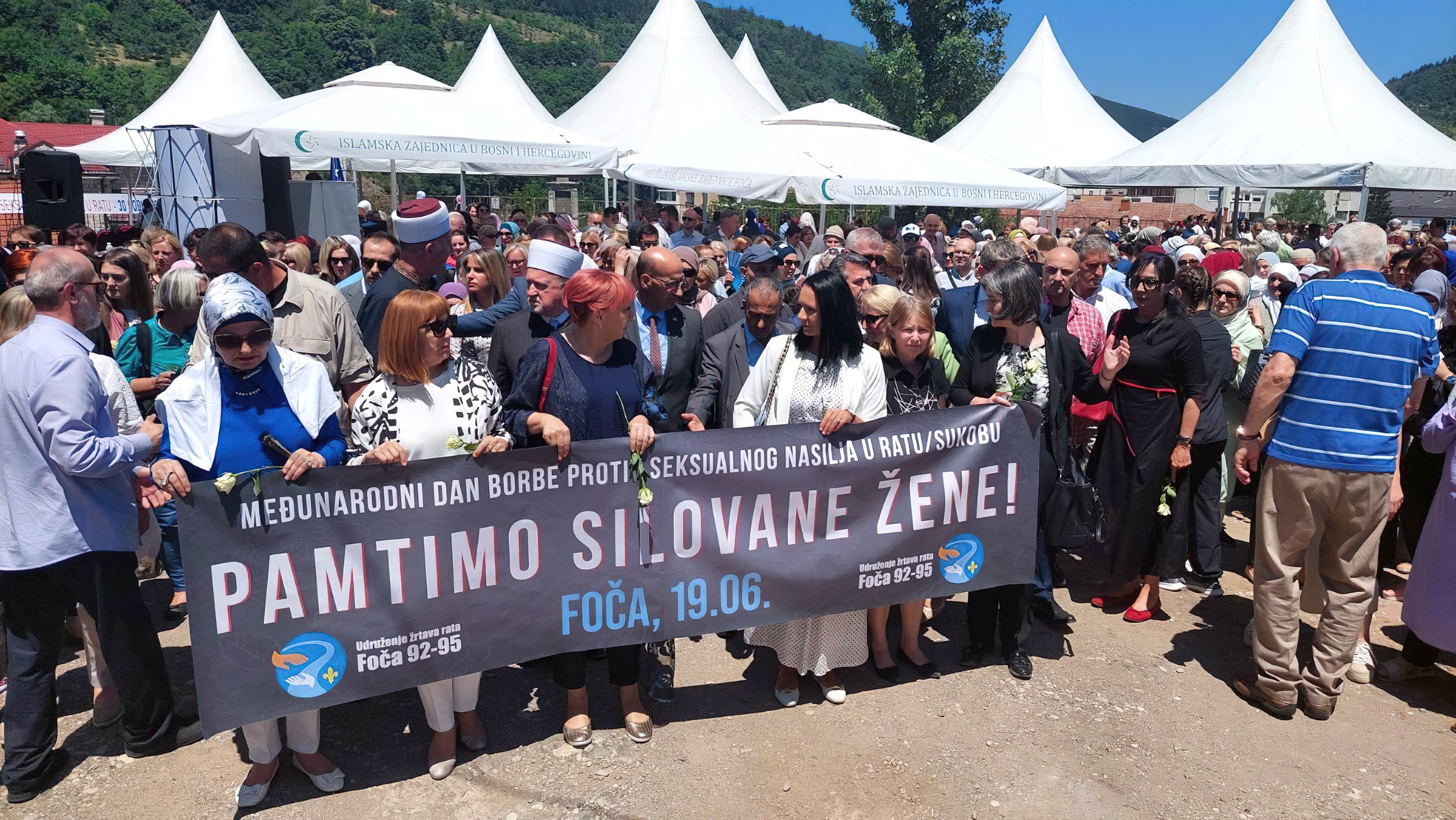FATWA ON THE STATUS OF RAPED WOMEN AND CHILDREN BORN OUT OF SUCH INTERCOURSE
Author: Ekrem Tucaković, PhD, Riyasat of the Islamic Community in Bosnia and Herzegovina • Photo: Observing the International Day of Combating Sexual Violence in Foča
According to estimates by the United Nations, between 20 and 50 thousand people – women, men and children, were exposed to sexual abuse and rape during the aggression on Bosnia and Herzegovina between 1992 and 1995. Serbian concentration camps and prisons in the regions of Prijedor, Foča anf Višegrad were the infamous sites of rapes.
International Criminal Tribunal for the former Yugoslavia (ICTY), founded by the Security Council of the United Nations, was the first in history to label sexual abuse and rape of women, men and children – boys and girls – in Bosnia and Herzegovina as a war crime. The Hague Tribunal judgement for Dragoljub Kunarac, Radomir Kovač and Zoran Vuković in 2001 was the first conviction for rape as a crime against humanity. It states that the Trial Chamber found that “members of the armed forces of Bosnian Serbs used rape as an instrument of terror”. Besides, at an earlier date, at the trial to Duško Tadić for crimes committed in the region of Prijedor, the Hague Tribunal processed sexual mutilation of men in the Omarska camp, which made Tadić the first war criminal whose conviction by the Hague Tribunal included sexual violence. The Hague Tribunal convicted over 30 war criminals for crimes of sexual violence as war crimes. Besides, courts in Bosnia and Herzegovina processed over 100 cases of sexual abuse and rape during the war.
As early as at the beginning of the aggression, in spring and summer of 1992, the Islamic Community was faced with a large number of inquiries about religious interpretation of the status of Muslim women raped by Serbian military and paramilitary armed formations and the status of the conceived embryo and the child. Glasnik, the official journal of the Islamic Community, as the response to a question asked in 1992, published the official opinion and attitude of Islam and the Islamic Community, a view which had the character of a distinctive fatwa, about raping women in military operations. The view was explained and signed by Muharem-ef. Omerdić, head of the Office of Religious Affairs of the Riyasat of the Islamic Community.
The introductory part points out that activities of aggressor's forces in Muslim settlements are in progress and that it often happens that Muslim women are raped and made love to under the threat of arms, which can lead to pregnancy. For this reason, the following question was asked: Is it allowed according to Sharia to perform the abortion of the embryo which was conceived in such an intercourse?
The response was as follows: – According to unanimous view of Islamic jurists, it is forbidden to perform an abortion later than 120 days after the conception, pursuant to the hadith that the soul is given to the embryo 120 days upon the conception. There are partial differences in some Sharia legal schools pertaining to a shorter time of the permission to terminate pregnancy, e.g. up to forty days. According to the view of Hanafi legal school, it is permitted to perform abortion up to 120 days after the conception if there is a valid reason for it ('uzr) (Fethu-l-kadir, 2:295; Reddu-l-muhtar 'ale-d-durri-l-muhtar, 2:380).
In line with this list, and having in mind that the conception occurred due to an infidel's violence, that this act disgraced a Muslim woman and that the birth of a child from such an intercourse is an unfortunate memory for his mother's whole life, Sharia permits abortion in a pregnancy of up to 120 days.
If more than 120 days pass from a conception out of a violent intercourse, which was discussed, the embryo must not be endangered on any grounds and the mother should give birth to him without a fault of her or his own. This child, born out of an illegitimate intercourse (gajru-š-šer'i), inherits only his mother and maternal relatives. Besides, the mother and maternal relatives inherit him. He does not inherit father or paternal relatives. Inheritance law provides that illegitimate children do not have a father or paternal relatives.
Consequently, a child born out of the described intercourse belongs to mother and she has the full right to his upbringing in the full sense of the word. Such a person, as well as his mother, should not be considered second-rate persons, or impure, since neither of them are to be blamed for what happened to them. The father is to blame. The Qur'an underscores that nobody should carry someone else's blame: No one will reap except what they sow. No soul burdened with sin will bear the burden of another (Al-An‘ām, 164); Every person will reap only what they sowed (At-Tūr, 21).
If the mother raises the child as a Muslim, the child will enjoy in the results of his beliefs and actions. The child is a Muslim. Surely those who believe and do good will have the Gardens of Bliss, staying there forever. Allah's promise is true. And he is the Almighty, All-Wise. (Luqmān, 8-9).
Thus, regardless of whether a person was born out of marital – legitimate or out of wedlock -illegitimate intercourse, if he is a Muslim and has done good he will enter Jannah (Paradise). Every Muslim is worth of respect, he is a God's being and is pure. Muhammed, a.s., says: “A Muslim cannot be impure.” (Buharija, Muslim, Ahmed and others.)
Observing the International Day of Combating Sexual Violence in Foča
References:
Glasnik Rijaseta Islamske zajednice, no. 3-4, 1992, pp. 168-169.

